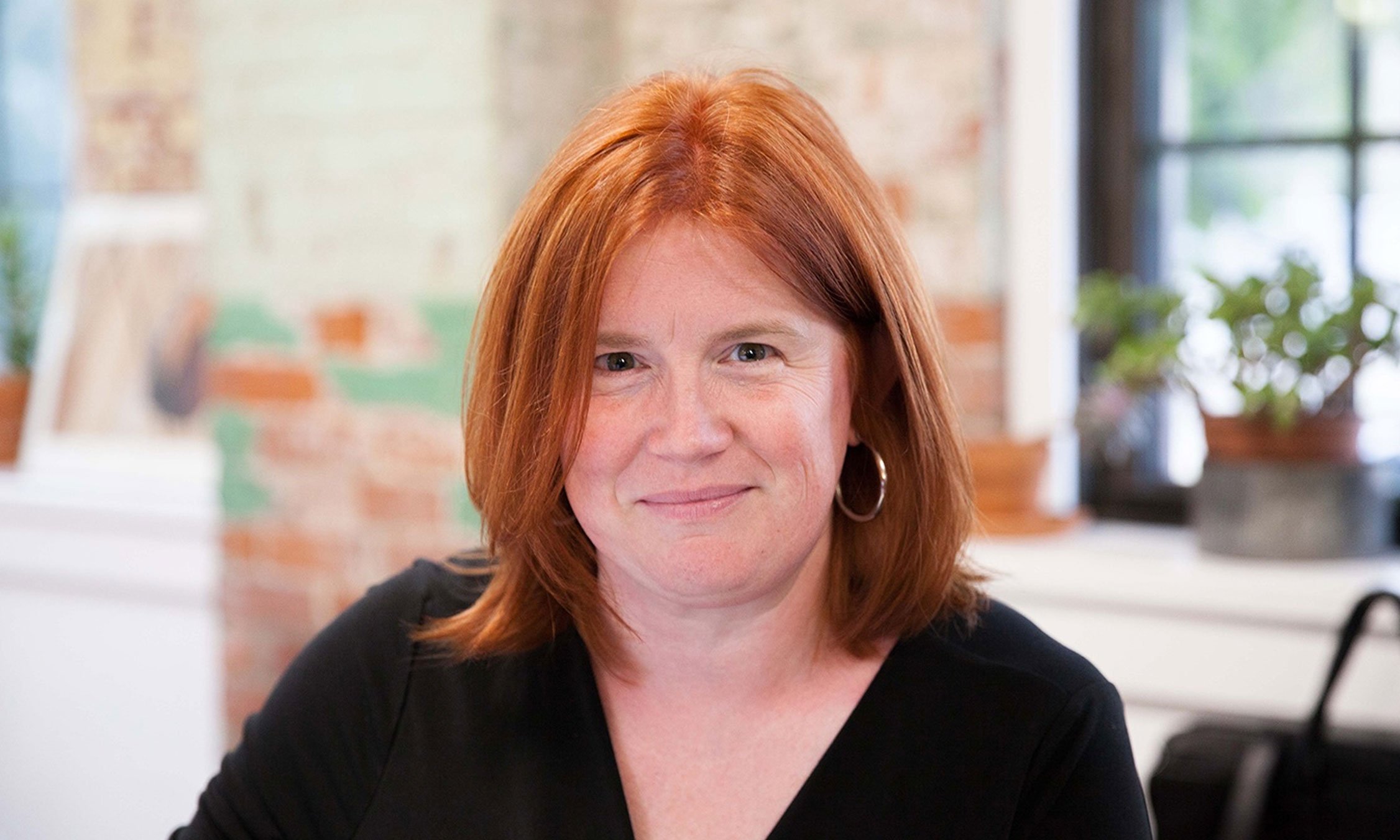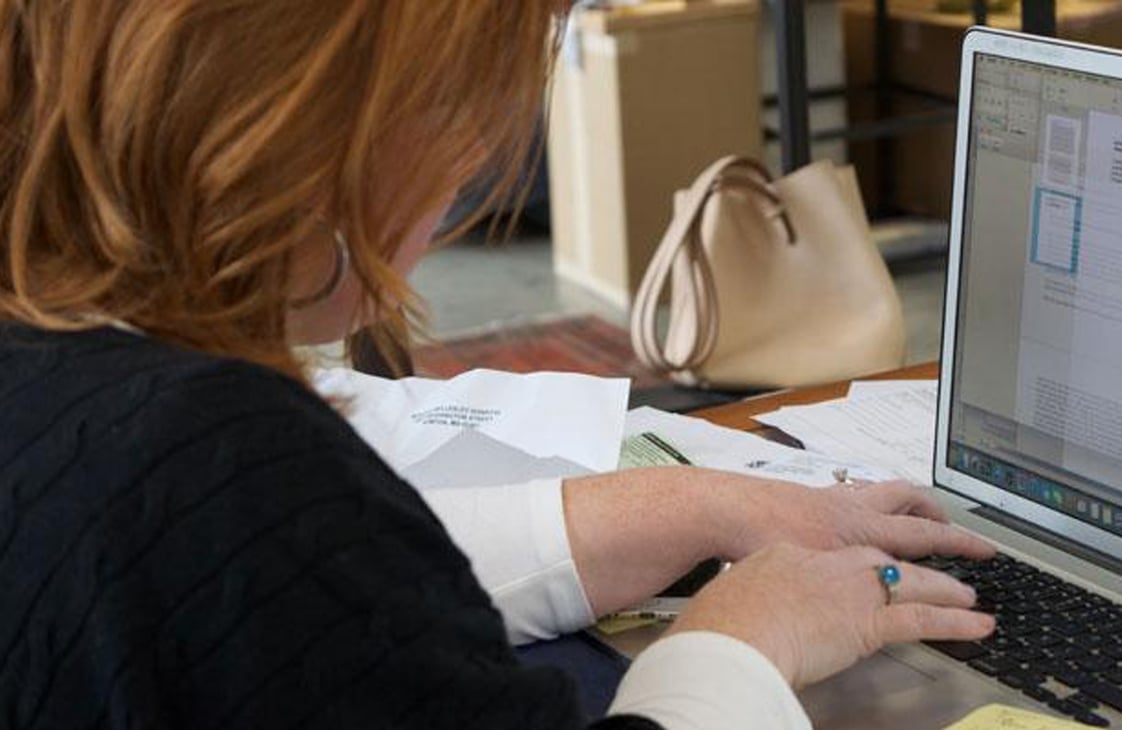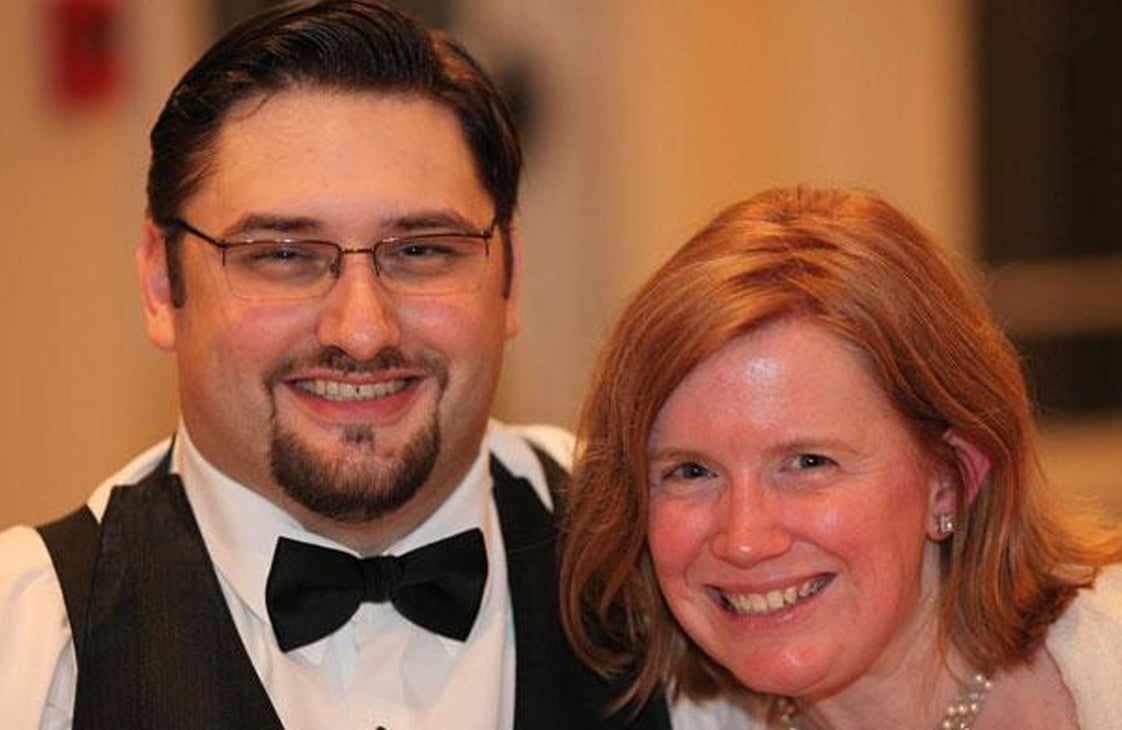
As the CEO of Lotuff, Ellen is the one who keeps the studio running at its best every day, solves our problems, and launches our ideas. Liz interviews her here to learn more about how she came to Lotuff and why she thinks the company is headed in the right direction.
You left college with a liberal arts degree. How did you find your way over to business side of things?
Right after I graduated, I was fortunate to get a job in PR for an advertising agency in Providence and where one of my first clients was Berkshire Blanket. Berkshire, like Lotuff Leather, was owned by the Lotuffs and Alden Edmonds. While I was in NY to help Berkshire out with a tradeshow, Joe and Alden literally offered me a job on the floor of the Javits Center. I agreed to become their Director of Marketing and moved out to Western Massachusetts. It was there I became immersed in business and teamed with a number of amazing talents to help grow Berkshire from $10MM - $110MM over eight years. Someone once joked that I “got my MBA on a factory floor,” and there is a little bit of truth to that. The business was small and entrepreneurial, and my exposure to all that it entailed was broad. I worked hand-in-hand with sourcing, design, sales, logistics and finance, and people were generous with their time and experience. I was able to observe how to effectively get things done. The danger in this kind of environment is that you could come out of that experience as a Jack of all Trades, Master of Nothing, but in the end, I had become exceptional at one thing: I could use sales data to predict retail market trends.
The 22-year-old English major in me would have been astounded that I would love numbers as much as I do, but when you consider the why of it all, it makes sense. Why I loved reading sales numbers is because they told a story about product—what consumers wanted to buy and what they didn’t want to buy. Products that satisfied a need and exposed a new opportunity for more new products. Products that had value because of their quality, their design, and their usefulness. This ability to pick up quickly on data patterns, back up observations with more data, and then direct a team to create new products that satisfy the needs is what has allowed me to grow in business. It’s a mix of instinct, experience and information. It’s always about getting a product to market.

Why do you think the Lotuff brand has been able to succeed as much as it has?
I am a believer that success needs to be fueled from all directions. Joe Lotuff, one of the co-founders, had the vision to reimagine American manufacturing. He wanted to create a business where people, who were exceptionally talented at working with their hands, could come and earn an honest living and provide for their families. He believed that the benchmark for quality in handmade leather goods needed to be improved and product such as ours needed to be more accessible to an entirely new generation—millennials who weren’t about fast fashion and disposable merchandise. He, along with all ownership, was willing to be patient and give the business necessary time to establish. Lindy McDonough, our creative director, had the understanding that Lotuff needed a studio and not just a traditional factory. She knew that we needed to identify a workforce that was about more than punching a clock. We needed artists. She knew that the aesthetic of the brand needed to complement and fit the product it represented. Lindy is a talent, and Lotuff would not be Lotuff without her.
Truly, our people are collectively the single most important reason the brand succeeds and others do not. We are where we are today because I believe our team cares more. We care about product in every stage of its development. We care about innovating and discovering better ways for the pieces to take shape. We care about the experience shoppers will have with these products over time. We care about cultivating relationships with our customers and ensuring that the products we make serve a purpose for them and do so beautifully. What I have described is not the experience of every business, but it is why I believe Lotuff is succeeding. And, what is exciting about where we are is how much further we can still improve and where we will go from here.
As the CEO, you typically have a lot on your plate. Has it always been in your nature to take on big workloads?
I have always been a glutton for punishment (laughs). I had a wonderful history teacher, Sr. Sylvia, and she believed my core weakness was that I had a problem saying no to people. She wanted me to make more choices and narrow my focus. Today I struggle with the same thing, and in these last few years, some of the best advice I got was from a former colleague, Pete. He advised me to select no more than three initiatives for a given year. Now my biggest challenge is figuring out just what I would like those to be! In a business such as Lotuff though, I do think it helps that my nature is to dive in and do.
One of our company’s greatest assets is the versatility of our team. There isn’t one person in this studio who doesn’t feel comfortable stretching beyond the limits of his/her own job description. If a truck needs to be unloaded, we are all there. If we have a large order that needs more hands on deck for processing and packaging, we all pitch in to help. There are details tied to consumer touchpoints too and for which I care about being a part of the work. If you write a blog post, I will jump in to edit copy. If the landing page on our website isn’t performing to forecast, I will adjust lay-out. If we’re training someone to package a product for one of our customers, I enjoy being able to walk one of our artisans through what it should look like. When Lindy is inspecting a new hide of leather, I like being able to go out onto the floor and see what she sees. There is a lot to what we do, and our longevity will be tied to it all being done well. I know the team cares about the details, and hopefully they’re assured that I care as much as they do.

Why do you think Providence is a fitting place for Lotuff to have set up shop?
I grew up in Rhode Island and so I remember what Providence used to be. My grandfather Fitzpatrick worked in a factory just down the street from where we are today—Brown & Sharpe. My Uncle Andy owned and ran a textile manufacturing plant no more than 10 minutes away. Manufacturing quality products was a critical component to employment in this state, and it provided good jobs. My mother received a wonderful education, and it was within her reach because back then a factory worker and a housekeeper could pool their income to afford her tuition payments. When manufacturing left this state in a big way, there was a vitality that was drained out of Providence in particular.
So, yes, I am happy to see a company like Lotuff establish a firm foothold here. I live in this state and believe that it will be businesses like ours that will help advance a mission focused on public prosperity, meaningful work, and a comfortable place to live and go home to at the end of the day. We are surrounded by some of the best educational institutions in the country. Maybe now, graduates will feel like they have a reason to stay if there are more businesses like Lotuff around?
What has been the biggest surprise for you—in a good way—about working here?
After Berkshire, I spent close to a decade consulting for retailers and traveling all over for engagements. I knew I would be happy to cut down on the travel, but I didn’t know how happy I would be to establish roots in a community. When I push open the sliding studio door in the morning, I like that the neighbors stop to say hello. I enjoy talking with the little boy on his bicycle or the mom with her stroller. Lotuff isn’t alone here. The people who live in this community bring their friends by, they attend our Studio nights and lobby on our behalf for tax stabilization laws! These people have been the best surprise, and we are incredibly lucky to live alongside them.

Leave a Comment